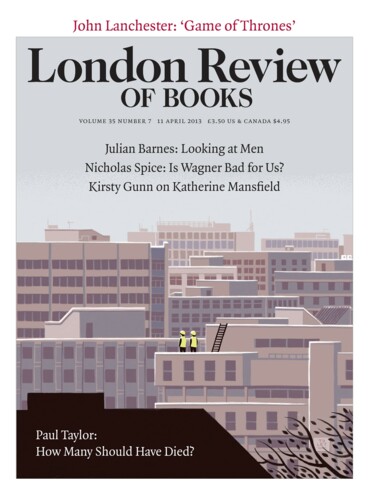London’s two velodromes were built in the 19th and 21st centuries. The indoor track at the Lee Valley Velodrome, one of the fastest in the world, is housed in a beautiful stadium built at cost of £94 million. Its distinctive roof, a hyperbolic paraboloid clad in 5000m2 of custom-cut Western red cedar, is a prominent landmark at the edge of the 2012 Olympic park. The open-air track at Herne Hill is completely hidden in a South London suburb.
Paul Taylor
Paul Taylor is professor of health informatics at UCL.
Breast Cancer Screening
Paul Taylor, 5 June 2014
In December 2013 the House of Commons Select Committee on Science and Technology announced an inquiry into the efficacy of screening for cancer. ‘The NHS spends a significant amount of money on health screening,’ Andrew Miller, the chair of the committee, said, ‘and it is important that this is underpinned by good scientific evidence.’ But the awkward truth is that much of the evidence is contested. The argument over breast cancer screening has been going on for decades, often bad-temperedly, and concerns not just the efficacy of the screening itself but its potential to do harm as well as good.
At the centre of Monday night’s Panorama programme on fraud in the NHS was an interview with Jim Gee, an expert on the financial cost of healthcare fraud. Gee showed the presenter a newly published report, of which he was the first author, and talked about its findings. He turned to a key page and the camera picked out a bar chart as the two discussed some of the figures it contained. The report was also given wide coverage in the print media this week. Stories were run in all the broadsheets and across the tabloids with many local papers picking up the story and giving it a local spin. The figure, highlighted in Panorama, that most journalists seized on was the estimate that fraud was costing the NHS around £7 billion a year, enough – the Express pointed out – to pay for 250,000 nurses.
According to the front page of yesterday’s Guardian, the NHS is to start selling our confidential medical records. Every doctor has a duty to keep patient-identifiable data secure, and only share it as far as is in the patient’s immediate best interests. At the same time, in order to run healthcare organisations or to carry out medical research, it is necessary to compile statistics about diseases and treatments. It therefore makes sense for some information collected in the course of caring for patients to be made more widely available – shared with managers, bureaucrats and researchers – but only if it is anonymised.
Rigging the Death Rate
Paul Taylor, 11 April 2013
The publication in February of the Francis Report into the failings of the Mid-Staffordshire NHS Foundation Trust was the worst of the many recent bad news stories about the NHS, its significance underscored by the fact that David Cameron felt it necessary to present the report to the House of the Commons himself, rather than leave it to the secretary of state for health. The public inquiry was set up in 2010 by the then secretary of state, Andrew Lansley, to investigate further the findings of a previous inquiry, commissioned by the Labour health minister.
Read anywhere with the London Review of Books app, available now from the App Store for Apple devices, Google Play for Android devices and Amazon for your Kindle Fire.
Sign up to our newsletter
For highlights from the latest issue, our archive and the blog, as well as news, events and exclusive promotions.



